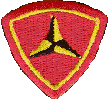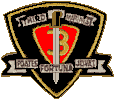Michael Melvin SparkColonelHQ CO, 3RD MARINES, 3RD MARDIV United States Marine Corps 09 June 1927 - 15 January 1969 New York, NY Panel 34W Line 010 |
 
|
 
|
The database page for Michael Melvin Spark
|
From first to last, more than just my twenty years' of service were affected positively by Colonel Spark. As a Captain, he was my first Commanding Officer (1st Amphib Recon Co). He accepted me for membership in his company despite my recent punitive reduction in rank and some suspicion that I might be a "wiseass". He sent me to my first service school; he promoted me two ranks in less than one year. It was his trusting acceptance of who I could be that turned my life totally around. I attended his wedding in 1956 in San Diego, and corresponded with him intermittently for a few years. I visited him and his wife in 1962 when he lived near Washington. It was next to impossible to be "friends", given our separation in rank, but that's the way I thought of him. It was no different near the end of his life. Before becoming CO of Third Marines, he had been the G-2 of the Third MarDiv in Dong Ha. When I checked into the division, I had just finished the Vietnamese Language Course at Monterey and was scheduled to go to an Interrogation-Translation Team. The G-2 held OPCON over all the specialist teams in the Division, so when a new officer (by that time I was a Captain) checked in, he was expected to meet with the G-2. Colonel Spark remembered me, expressed his regard for my being again under his aegis, and assigned me to be the new G-2 of Task Force Hotel, a task-organized headquarters holding forth at Fire Support Base Vandegrift, out in the mountains of Quang Tri Province, just below the DMZ. I had relieved a Lieutenant Colonel, and my new bosses, a Major General commanding and a Colonel Chief of Staff, were not particularly pleased that a Captain had been assigned to the job. Colonel Spark assuaged their doubts, I found out later, and cleared the way for the most challenging and rewarding job I ever had - ever! As a frequent helicopter rider with the Division CG, General Davis, Colonel Spark was in our headquarters almost daily. By radio, I talked with him several times daily about one intelligence problem or another. He listened to my ideas, encouraged me to think independently (the term "outside the box" hadn't become popular yet), and supported me with every intelligence asset available to Task Force Hotel's area of responsibility. When he left 3rd MarDiv HQ to become CO of the 3rd Marines, I thought my days of serving in a billet way above my rank would end. Not so! He had left good words behind him, and I stayed in the job. When he was killed, I made the trip to Dong Ha to attend the memorial service, and cried - for only the second time since I had become a Marine. I think nearly daily of his ability to motivate people, to get the best out of everyone associated with him, his incredible personal mental abilities, and his absolute dedication to tough jobs performed in difficult circumstances. Even now, at age 75, I cannot envision what my life would have been like had he not touched it. I'm glad to be leaving this note somewhere where perhaps others may read it and reflect on the effects that really good leadership can have on the fortunes of others.
From a friend, |
|
takes pride in presenting the Navy Crossto
Michael Melvin Spark
for service as set forth in the following
|
Notes from The Virtual WallWhen this memorial was first published, the only thing certain was that four Marines died when the helicopter in which they were flying crashed:
Although U.S. Marines in Vietnam, 1969 states that "an Army UH-1H helicopter" was involved in the loss, and that all aboard the aircraft were killed,
Eight men, not four, died in the crash:
|
|
Top of Page
www.VirtualWall.org Back to |
With all respect
Jim Schueckler, former CW2, US Army
Ken Davis, Commander, United States Navy (Ret)
Channing Prothro, former CAP Marine
Last updated 08/10/2009